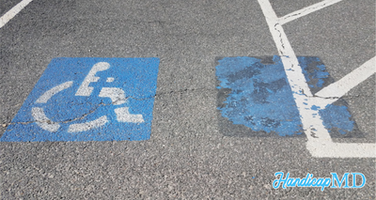
Online Guide to Disabled Parking in Texas
Introduction
Welcome to the comprehensive guide on handicap parking in Texas. This article aims to provide you with a complete understanding of the rules, regulations, and requirements related to handicap parking in the state. Whether you are a disabled individual seeking information about accessible parking spaces or a caregiver assisting someone with mobility challenges, this guide will serve as your go-to resource. Let's dive into the details and ensure you have the knowledge you need to navigate handicap parking in Texas effectively.
Understanding Disabled Parking
Handicap parking, also known as accessible parking, refers to designated parking spaces specifically reserved for individuals with disabilities. These spaces are strategically located near building entrances, ensuring ease of access for disabled individuals. Disabled parking spaces are wider than regular parking spaces and are marked with the international symbol of accessibility—a blue and white wheelchair symbol.
Accessible Parking Spaces in Texas
Texas law mandates the provision of accessible parking spaces in public areas such as shopping centers, hospitals, airports, and government buildings. These spaces are reserved for individuals with disabilities who possess a disabled parking permit or license plate. The number of accessible parking spaces required depends on the size and purpose of the parking facility.
To ensure compliance with the law, parking lots must have a minimum number of accessible spaces, including van-accessible spaces. Van-accessible spaces are larger and are designed to accommodate wheelchair-accessible vans with side-loading features.
Obtaining a Disabled Parking Permit
To qualify for a handicap parking permit in Texas, an individual must have a qualifying medical condition that substantially impairs their mobility. Common conditions include limited mobility due to orthopedic, neurological, cardiovascular, or respiratory impairments.
To obtain a disabled parking permit, you need to complete an application form available from the Texas Department of Motor Vehicles (DMV) or their website. The form requires medical certification from a licensed healthcare provider, verifying your eligibility for a disabled parking permit. Once approved, you will receive a placard or license plate that grants you the privilege of parking in designated disabled parking spaces.
Rights and Privileges of Disabled Drivers
Disabled drivers with valid disabled parking permits or license plates in Texas are entitled to certain rights and privileges. These include:
- Parking in designated handicap parking spaces, ensuring proximity to entrances
- Exemption from parking meter fees in certain circumstances
- Extended parking time in metered or timed parking areas
- Access to parking spaces reserved for people with disabilities, even if the vehicle does not display a disabled parking permit or license plate
Parking Violations and Penalties
It is essential to adhere to the rules and regulations governing disabled parking in Texas to avoid penalties and fines. Violations may include parking in a disabled space without a valid permit, misusing someone else's permit, or parking in an access aisle adjacent to a disabled space.
Penalties for parking violations can vary depending on the specific offense and jurisdiction. In Texas, fines can range from $500 to $1,250 for parking in a disabled space without proper authorization. It is crucial to respect these parking spaces and ensure they are available for those who genuinely need them.
Frequently Asked Questions
FAQ 1: How long does it take to obtain a disabled parking pass?
The processing time for a disabled parking pass in TX can vary. Generally, it takes around 10 to 14 business days from the date of application submission to receive your handicap placard or license plate. It is advisable to apply well in advance to ensure you have the pass when you need it. Renewals are approximately the same time frame.
FAQ 2: Can out-of-state disabled parking passes be used in Texas?
Yes, TX recognizes out-of-state disabled parking passes. If you have a valid disabled parking pass issued by another state, you can use it in Texas during your visit. However, it is essential to familiarize yourself with Texas parking regulations to ensure you comply with the local requirements.
FAQ 3: Are disabled parking spaces free?
Disabled parking spaces themselves are not free. However, individuals with valid disabled parking passes or license plates are often exempt from paying parking meter fees in certain circumstances. It is crucial to check the local parking regulations to understand the specific privileges granted to disabled drivers in TX.
FAQ 4: How do I report abuse of disabled parking spaces?
If you witness the abuse of disabled parking spaces, you can report it to the local law enforcement authorities or the property owner or manager responsible for the parking facility. Be prepared to provide accurate information such as the license plate number, date, time, and location of the violation. Your report can help ensure that accessible parking spaces are used correctly and are available to those who need them.
FAQ 5: Can I use someone else's disabled parking pass?
No, it is illegal to use someone else's disabled parking pass. Disabled parking passes are issued to individuals based on their specific medical condition and mobility needs. The pass is non-transferable and should only be used by the person to whom it is issued. Misusing a disabled parking permit can result in penalties and fines.
FAQ 6: What should I do if a disabled parking space is occupied illegally?
If you come across a disabled parking space occupied by a vehicle without a valid disabled parking pass, you can take the following steps:
- Take note of the vehicle's license plate number, make, and model.
- Check if there is any contact information displayed on the vehicle, such as a phone number.
- Inform the property owner or manager responsible for the parking facility.
- If necessary, contact local law enforcement authorities and provide them with the relevant details.
By reporting illegal parking in disabled spaces, you contribute to ensuring the availability of these spaces for those who genuinely need them.
Conclusion
In conclusion, navigating handicap parking in Texas requires an understanding of the rules, regulations, and privileges associated with accessible parking spaces. By following the guidelines outlined in this guide, you can ensure compliance, respect the needs of disabled individuals, and contribute to a more inclusive and accessible community. Remember, handicap parking spaces are vital for providing equal opportunities to individuals with disabilities, and by respecting these spaces, you are promoting inclusivity and compassion.
.png)






